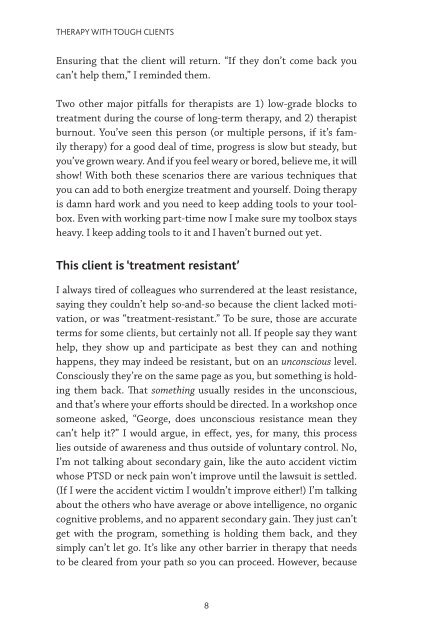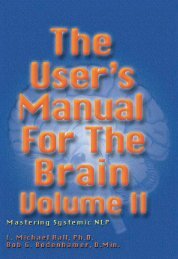Therapy Tough Clients
Look Inside - Crown House Publishing.
Look Inside - Crown House Publishing.
- No tags were found...
Create successful ePaper yourself
Turn your PDF publications into a flip-book with our unique Google optimized e-Paper software.
THERAPY WITH TOUGH CLIENTSEnsuring that the client will return. “If they don’t come back youcan’t help them,” I reminded them.Two other major pitfalls for therapists are 1) low-grade blocks totreatment during the course of long-term therapy, and 2) therapistburnout. You’ve seen this person (or multiple persons, if it’s familytherapy) for a good deal of time, progress is slow but steady, butyou’ve grown weary. And if you feel weary or bored, believe me, it willshow! With both these scenarios there are various techniques thatyou can add to both energize treatment and yourself. Doing therapyis damn hard work and you need to keep adding tools to your toolbox.Even with working part-time now I make sure my toolbox staysheavy. I keep adding tools to it and I haven’t burned out yet.This client is ‘treatment resistant’I always tired of colleagues who surrendered at the least resistance,saying they couldn’t help so-and-so because the client lacked motivation,or was “treatment-resistant.” To be sure, those are accurateterms for some clients, but certainly not all. If people say they wanthelp, they show up and participate as best they can and nothinghappens, they may indeed be resistant, but on an unconscious level.Consciously they’re on the same page as you, but something is holdingthem back. That something usually resides in the unconscious,and that’s where your efforts should be directed. In a workshop oncesomeone asked, “George, does unconscious resistance mean theycan’t help it?” I would argue, in effect, yes, for many, this processlies outside of awareness and thus outside of voluntary control. No,I’m not talking about secondary gain, like the auto accident victimwhose PTSD or neck pain won’t improve until the lawsuit is settled.(If I were the accident victim I wouldn’t improve either!) I’m talkingabout the others who have average or above intelligence, no organiccognitive problems, and no apparent secondary gain. They just can’tget with the program, something is holding them back, and theysimply can’t let go. It’s like any other barrier in therapy that needsto be cleared from your path so you can proceed. However, because8

















